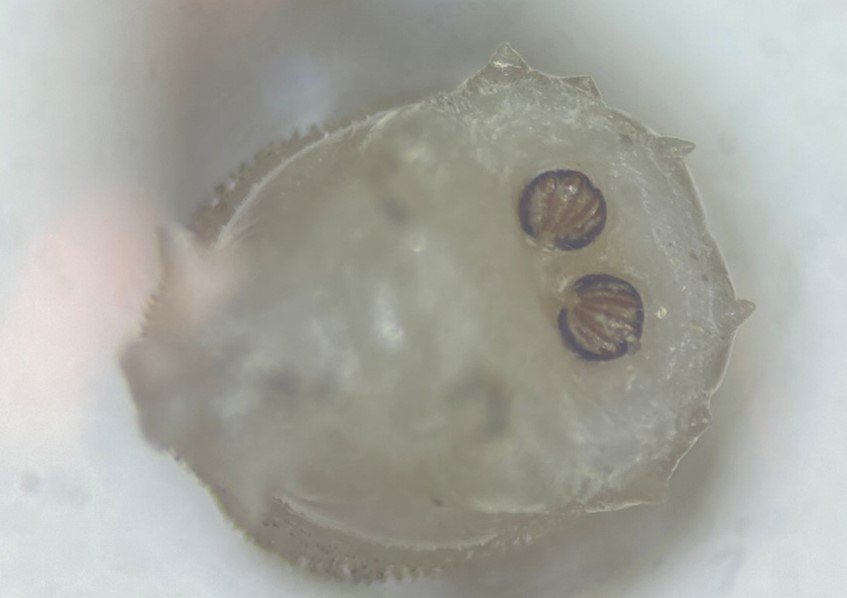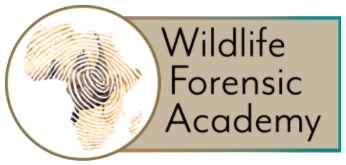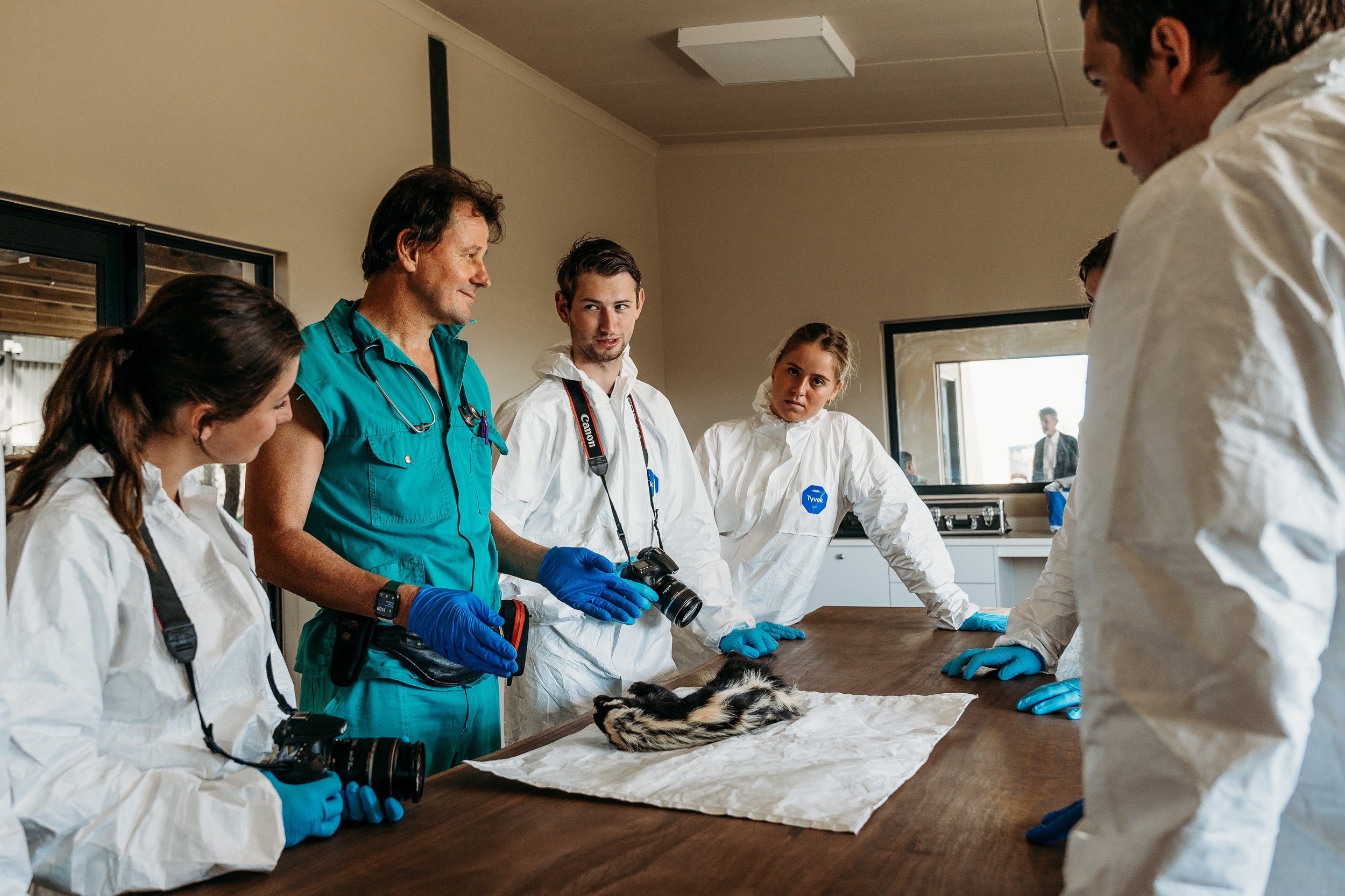Newsletter: 4th Edition
An interview with Professor Eric van Gorp: Bridging medicine and wildlife forensics
Prof. Eric van Gorp, infectologist and virologist at Erasmus MC in Rotterdam, has dedicated his career to understanding infectious diseases. His expertise lies mostly in zoonoses: diseases which are transmitted from animals to humans. Eric’s research has taken him across the globe, from Indonesia and the Caribbean to South Africa, where he investigated and treated Dengue, Zika, COVID-19, HIV, and more.
Eric has recently partnered with the Wildlife Forensic Academy through a shared vision of addressing the intersection between wildlife trafficking and infectious diseases. This initiative highlights the critical role of customs and border controls in intercepting illegal wildlife products that may carry zoonotic pathogens.
“Approximately 75% of new infectious diseases originate from animal reservoirs”, explains Eric. “Wildlife trafficking presents a dangerous risk of these diseases crossing species barriers, leading to potential outbreaks. Customs agents serve as one of the first lines of defense in stopping this chain of transmission.” Eric points to bushmeat consumption as a notable example, where handling and consuming wild animal meat have been linked to outbreaks of diseases like Ebola. The lack of regulation and monitoring in illegal wildlife trade increases these risks, making it a critical area for intervention.
Eric and WFA have already worked together to develop the Wildlife and Wicked Problems Masterclass. The Masterclass aims to educate a broad audience on various aspects of wildlife and its impact on human health. The course highlights the significance of the One Health approach, recognising and appreciating the interconnectedness of human, animal, and environmental health.
“One Health is an integrated, unifying approach that aims to sustainably balance and optimize the health of people, animals and ecosystems.
It recognizes that the health of humans, domestic and wild animals, plants, and the wider environment (including ecosystems) are closely linked and interdependent.” - WHO, 2024
The partnership between Erasmus MC and WFA is breaking new ground by combining medical research and wildlife forensics. Future plans include growing the Masterclass to welcome a wider range of students, with more participants from South Africa. There is also a vision to create training facilities that simulate the effects of infectious diseases, helping students learn through hands-on experiences and better prepare for real-world challenges.
Are you as inspired as we are by this collaboration and curious about the ambitions of WFA & One Health? Stay up to date with our plans to tackle wildlife trafficking at customs level through our newsletter, website and social media!
WFA making an impact at key events
Wildlife and Environmental Crimes Summit - Homeland Security | Washington DC, United States of America | September 4-5, 2024
This summit, organised by Homeland Security Investigations (HSI), highlighted the importance of collaboration and coordination among U.S. agencies, international partners, and NGOs in combatting wildlife trafficking and nature crimes. Some of the issues discussed at the summit:
strengthening law enforcement
supporting local communities
disrupting criminal networks
Initiatives such as the Nature Crime Alliance were showcased as key efforts to advance conservation and combat transnational nature crime effectively.
WFA was honoured to be invited to the summit, where the Academy was notably featured in the HSI presentation. It was highlighted that WFA is the world’s sole provider of wildlife forensic courses conducted in a hands-on laboratory environment. To strengthen and expand our collaboration, HSI plans to visit the Academy again for training in the near future.
Snare Mitigation Symposium | Pretoria, South-Africa | September 10-11, 2024
WFA’s co-founder and in-house veterinarian Greg Simpson took part in the Snare Mitigation Symposium, which revolved around unravelling the complex crisis of illegal snaring. The event was attended by 140 delegates, including experts in wildlife crime and government officials.
The symposium was described as a “crucial platform for raising awareness about the devastating impact of snares on wildlife”. It provided valuable opportunities for building connections - an essential element in tackling the snaring crisis, according to the discussions held at the event.
The event's success is thanks to all participants who engaged in dialogues, shared stories, and contributed to implementing solutions for this complex threat to biodiversity.
The symposium was co-led by the Department of Forestry, Fisheries and the Environment, the Cape Leopard Trust, the Endangered Wildlife Trust, the South African National Biodiversity Institute and South African National Parks.
John Jay College of Criminal Justice | New York, United States of America | December 11, 2024
During a visit to John Jay College, WFA’s team raised awareness for wildlife forensics as an integral part of criminal justice. Our team met with the college’s science faculty, including Dr. Gohar Petrossian (Deputy executive officer of the criminal justice doctoral programme) and Dr. Hung-En Sung (Director of international research and partnerships). After a tour of the impressive forensics lab, WFA lectured on the relevance of wildlife forensics and the Academy’s approach. The presentation was attended by more than 100 students.
We are looking forward to a continued collaboration with the prestigious John Jay College!
Law Enforcement and Expert Training | Atlanta, United States of America | December 12-13, 2024
In partnership with WFA, the Wildlife CSI Academy organised a 8-hour training approved by the Police Officer Standard Training Council. This is the first time WFA has been approved for American Police Training hours.
The Wildlife CSI Academy is a law enforcement-based training academy that supports WFA in America. For example, the Wildlife CSI Academy offers National Law Enforcement training across the USA. The courses are open to active law enforcement, prosecutors, CSIs, and detectives. These investigative training sessions cover crimes like poaching, trafficking, and illegal wildlife trade.
4 experts from WFA attended the Law Enforcement and Expert Training in Atlanta. Our team presented on a set of subjects related to wildlife crime:
CEO Andro Vos spoke about the origin and aim of the Academy
Co-founder and veterinarian Greg Simpson lectured on veterinary forensics
Barbara Varekamp, WFA secretary and course developer, spoke about the Wildlife and Wicked Problems Masterclass
Dr. Claire Gwinnett, Professor in Forensic and Environmental Science at Staffordshire University, gave a lecture on the application of forensic science in wildlife crime investigations.
Around 30 experts from various criminal justice fields in the USA attended the lectures. The group included judges, attorneys, forensic scientists, and representatives from universities and high schools.
We are excited to welcome high school students from Atlanta in the near future through a study abroad curriculum.
Read more about the training via the link here.
Curious minds at work: Research by WFA Interns
Caracal Family Spotted in Scavenger Research project
by: Sara Willemse
As part of her project, Sara acquired video evidence of a female caracal with three cubs. This is unique material and a rewarding result for Sara’s project on scavengers. Find the video on our social media channels!
Plant Growth as a Marker for Hidden Carcasses
by: Gydo Tiggelaar
Gydo's research investigates whether significant differences in plant growth occur around decomposing carcasses and how these differences relate to soil conditions, particularly ammonia levels. His project explores the possibility that carcasses, by releasing nitrogen that is converted into ammonia in the soil, could accelerate plant growth in their vicinity.
To examine this, Gydo compares plant growth around decomposition sites to control plots and skeletons. He collects daily soil samples from underneath fresh carcasses, positioned especially for the interns’ research projects, and measures their pH levels to assess the impact of ammonia.
Through his research, Gydo develops a method of using plant growth as a tool to locate hidden carcasses, helping to identify decomposition sites that might otherwise remain undetected.
Using AI to Identify Maggot Species in Forensic Cases
by: Elin Rikken
For the past 4-5 months, Elin has been researching maggot species found on wildlife carcasses - surprisingly useful information in the investigation of crimes like poaching.


Maggots go through different life stages, which take a certain amount of time depending on the species. By identifying both the species and the life stage of a maggot, it will be possible to estimate the time of egg-laying. Since flies usually lay their eggs in the carcass shortly after an animal has died, this timeline helps us pinpoint when its death occurred; maggots are like little biological clocks! Knowing when a crime took place can be crucial for building a case, helping to narrow down suspects and verify alibis.
At WFA, Elin is expanding a database of maggots, including photos of them at various life stages and their species name. This data is then being used to train an AI model to automatically identify maggot species and their stages. If the AI works well, it will make identifying maggots faster and easier, saving forensic investigators a lot of time.
Revolutionising Entomology Using AI
by: Maaike Vogelaar
Maaike’s research focuses on entomology. What does this have to do with wildlife forensics? It is quite essential actually! Identifying the types of insects, especially flies, around a carcass can help determine the time of death of poached animals. Currently, rangers often lack the expertise to identify fly species. Maaike is contributing to the advancement of an AI model which assists with automatic fly identification.
Maaike is now collecting images of different fly species present around a carcass. The images are used to train and test the AI model, aiming to enable rangers to photograph a fly and receive accurate species identification from the model.
Behind the Scenes With Landi Retief: Keeping WFA Running Smoothly
Landi plays a pivotal role at the Wildlife Forensic Academy, where her passion for the environment and strong attention to detail ensure the smooth and efficient operation of the Academy’s activities. Her international experiences and dedication to conservation make her an invaluable asset to the team. Let’s find out what it takes to keep WFA and its courses running from day to day!
Can you give us a short run-through of your average day at WFA?
Landi: “My days are quite varied. While we are running courses, the days are really fast-paced and can consist of making sure everybody is on schedule and everything is in its place, managing the chain of command so information does not get lost, lots of WhatsApp communication, meetings, networking, answering emails and quick problem-solving when things go wrong – a little bit like juggling flaming torches. Because we are a relatively small permanent team on site, I find myself being engaged in some ‘off-beat’ activities some days as well – trying to catch and release the office mouse or a bird that had accidentally trapped itself, chasing a snake out the back door or assisting with photographing decomposing animals as part of student research. My quiet days consist of me catching up on admin and checking in on our interns. Insert here my sugar-free hot chocolate and the giraffes and rhinos outside my office window = dream job.”
What event or activity have you enjoyed most at WFA in the years you have worked at the Academy and why?
“Whenever we train a new group of rangers, this is added to the list of events that stands out as my favourites. To train rangers in forensics and courtroom procedures was the reason the Academy was started, and it is wonderful to see how we are able to make a difference in the conservation industry by developing a vital part of the skills needed by rangers. Sometimes we host professionals from abroad on the same courses as African rangers. It’s always great to see how our colleagues in the industry connect with each other at mealtimes, not only bringing their energy and enthusiasm to the table, but also sharing their knowledge with each other. In the conservation field there is power in collaboration.”
What is most challenging about your job?
“The most challenging part of my job is probably balancing the many moving parts, especially when it comes to coordinating courses. Having been a conservation manager of a nature reserve in the past, I have learnt that the trick is to stay organised, flexible and adaptable. If you were planning to do a game count and now there is a wildfire, keep calm, carry on and go get the fire truck!”
What aspects of your work at WFA make you proud?
“I take the most pride in being able to contribute to the Academy’s overall mission by making the ‘behind-the-scenes’ magic happen. It’s nice to see the impact of what we're working on come to life.”
Course recaps
Wildlife and Wicked Problems Masterclass
The Masterclass recently concluded, offering participants a dynamic exploration of wildlife crime as a complex, interdisciplinary challenge. The training delved into the interconnected aspects of wildlife crime, including zoonotic diseases, political implications, and conservation policies, fostering a deep understanding of the broader context of these issues.
Participants praised the Masterclass for its interactive structure and the opportunity to work alongside peers from diverse fields, such as veterinary science, law and forensic science. The hands-on sessions, combined with stimulating discussions, enabled attendees to apply theoretical concepts to real-world scenarios effectively. Testimonials emphasised the value of the programme in equipping them with actionable tools to approach these "wicked problems," making it a transformative experience for all involved.
Design Thinking Leadership
The second edition of this unique course took place in November. We were joined by 15 international professionals from diverse backgrounds, including participants from the United States, the Netherlands, Romania and Ghana, enabling a rich exchange of ideas and perspectives.
The participants actively engaged in various working groups, tackled real-world case studies and learned from distinguished guest speakers such as Erwin Schwella, Carl Nortier, Jan Marx, and The Landmark Foundation, all led by prof. Désirée van Gorp from Nyenrode University.
The Design Thinking Leadership Course provides participants with unique insights into leadership, collaboration, and innovation.
The second edition was a renewed success, and participants experienced both personal and professional gains.
Avian Forensic Course
The Wildlife Forensic Academy is proud to launch the world’s first Avian Forensics Course - a unique two-week programme designed to equip professionals with the skills to combat crimes against birds. Wildlife crime against birds is a significant global issue, threatening biodiversity and ecosystem health. Each year, millions of birds are illegally poached, trafficked or killed for trade, sport and cultural practices. Iconic species, including raptors and songbirds, face population declines due to habitat destruction and illicit activities, exacerbating conservation challenges and undermining legal protections.
During the Avian Forensics Course, participants will take a deep dive into the fascinating world of avian biology; from the structure of a bird’s beak to the patterns on its feathers. Additionally, participants will gain valuable hands-on experience through investigating crime scenes involving birds, including conducting post-mortem examinations, and learning about the courtroom procedures needed to bring offenders to justice. The training includes a visit to a national park and a bird rehabilitation centre, where participants can witness the challenges faced by conservationists and rehabilitators.
. An overview of the educational objectives of the Avian Forensics Course:
Avian taxonomy and morphology
Avian tracking and trade
Avian first aid and postmortem
Understanding cultural uses of birds
Crime scene management and documentation
Veterinary Forensic Course
Veterinarians play a crucial role in wildlife crime investigations. These professionals work alongside law enforcement, wildlife officials and conservation organisations, bringing essential expertise to areas such as forensic analysis, rehabilitation of seized animals, and disease prevention.
WFA is now offering one- and two-week courses for veterinarians and veterinary students, equipping them with specialised skills to bridge the gap between medical science and conservation enforcement. These courses provide a blend of theoretical knowledge and practical experience, covering wildlife forensics, crime scene processing, forensic necropsies, and the impact of human-wildlife conflict. On top of that, participants will learn about wildlife pharmacology, toxicology, and the complexities of wildlife crimes like poaching and trafficking. The programme includes hands-on training, survival skills, and insights into legal and cultural aspects of wildlife protection.
As the holiday season approaches, we would like to take a moment to reflect on the progress we have made this year and express our gratitude for your support. From fostering partnerships across the globe to advancing critical research and education in wildlife forensics, 2024 has been a truly transformative year.
We look forward to the year ahead, filled with new courses, collaborations, and conservation efforts.
Thank you for being part of our mission to protect wildlife.






